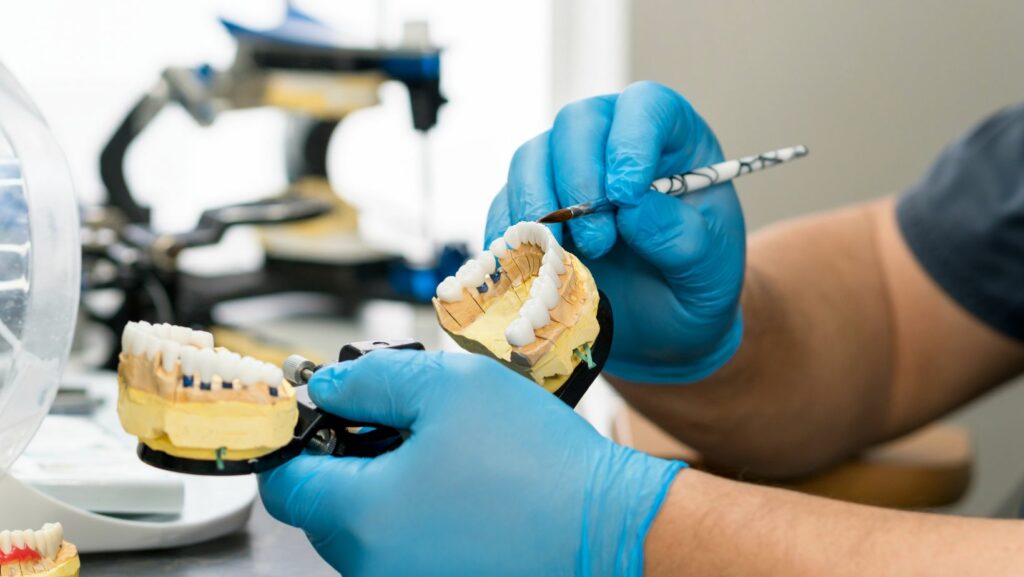
When it comes to replacing missing teeth, dental implants, and bridges are two of the most common options available. While both can effectively restore function and aesthetics, there are some key differences between dental implants vs. bridges that patients should consider when making a decision.
Dental implants are individual titanium posts that are surgically inserted into the jawbone. Once the implant is securely in place, a crown is attached to the top to create a natural-looking tooth replacement. On the other hand, a dental bridge uses two surrounding teeth on either side of the gap to anchor a prosthetic tooth in place.
One of the biggest advantages of dental implants is that they are designed to mimic the look, feel, and function of natural teeth. With proper care, they can last for decades and offer exceptional stability. However, they do require a minor surgical procedure and a longer treatment timeline than bridges. Meanwhile, bridges may be a more cost-effective and efficient option for some patients but do require alteration of surrounding teeth and may not offer the same level of long-term strength and durability as implants.
If you want more content like this see our next post!
Dental Implants vs. Bridge
When comparing dental implants vs. bridges, it’s essential to evaluate their pros and cons to make the right decision for your oral health and budget. Here are the benefits and drawbacks of dental implants:
Pros
- A long-term investment: Dental implants are anchored into the jawbone, making them a long-lasting solution compared to bridges.
- Preserve healthy teeth: Unlike bridges, dental implants don’t affect the surrounding teeth since they don’t rely on them.
- Prevent bone loss: After tooth loss, the jawbone can deteriorate over time, but dental implants promote healthy bone growth.
- Natural look and feel: Dental implants mimic the look, feel, and function of natural teeth, which can boost your confidence and self-esteem.
Cons
- Expensive: Dental implants require surgery and are more costly than bridges, making them less accessible for some patients.
- Time-consuming: Getting dental implants requires multiple visits to the dentist, and the healing process can take several months.
- Surgery risks: As with any surgery, there are risks involved, such as infection, nerve damage, or implant failure.
- Not for everyone: Dental implants require a healthy jawbone and gum tissue, making them unsuitable for some patients, such as those with gum disease or a weakened immune system.
Overall, dental implants offer a durable, natural-looking, and functional solution to tooth loss, but they’re not without their drawbacks. If you’re struggling to decide between dental implants vs. bridge, it’s best to consult with your dentist to discuss which option is best for you based on your needs and budget.
Dental Bridges: Pros and Cons
When it comes to replacing missing teeth, dental bridges are a popular option. They are designed to fill the gap created by one or more missing teeth by anchoring them onto the adjacent healthy teeth. Here are some pros and cons of dental bridges that you should consider before making a decision between dental implants vs. bridges.

Pros of Dental Bridges
- Affordable: Dental bridges are less expensive compared to dental implants, making them a preferred option for patients who are on a budget.
- Quick and Easy: Getting dental bridges is a quick and easy process that typically requires just a few appointments. Patients do not have to undergo surgery or wait for months, as with dental implants, to complete the procedure.
- Restores Chewing Functionality: Dental bridges can restore your ability to chew and speak properly, which can enhance your overall quality of life.
- Prevents Teeth Shifting: By filling the gap created by missing teeth, dental bridges can prevent the surrounding teeth from moving out of their position, which can lead to further dental issues.
Cons of Dental Bridges
- Shorter Life Span: Dental bridges have a relatively short lifespan of 5-15 years and may need to be replaced periodically.
- Requires Healthy Teeth: In order to support the dental bridge, the adjacent healthy teeth need to be filed down, which can compromise their structural integrity.
- Difficult to Clean: Dental bridges are connected, making them difficult to clean and maintain. This can increase the risk of tooth decay, gum disease, and other oral health problems.
- Less Natural Appearance: Compared to dental implants, dental bridges may not look as natural, depending on the quality of materials used.
While dental bridges are a suitable option for replacing missing teeth, it’s important to consult with your dentist to determine if they are the best option for your specific dental needs and budget. Ultimately, the decision between dental implants vs. bridge will depend on various factors, including your dental health, lifestyle, and budget.












